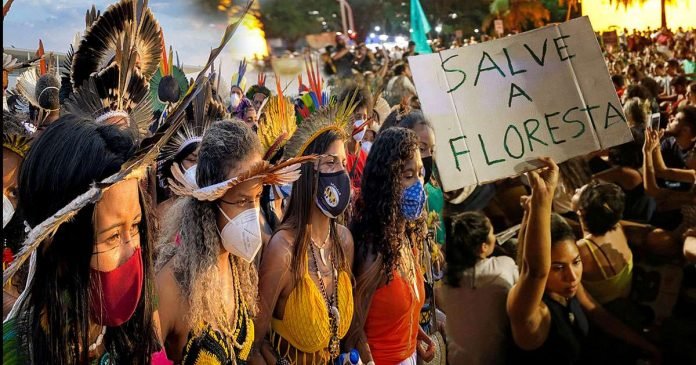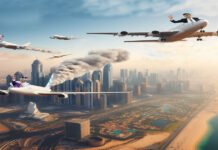Deforestation in the Brazilian Amazon is driven largely by criminal networks that use violence and intimidation against those who try to stop them, and the government is failing to protect the rainforest’s defenders.
This statement was originally published on hrw.org on 17 September 2019. Deforestation in the Brazilian Amazon is driven largely by criminal networks that use violence and intimidation against those who try to stop them, and the government is failing to protect both the defenders and the rainforest itself, Human Rights Watch said in a report released today.
The 165-page report, “Rainforest Mafias: How Violence and Impunity Fuel Deforestation in Brazil’s Amazon forest Mafias,” documents how illegal logging by criminal networks and resulting forest fires are connected to acts of violence and intimidation against forest defenders and the state’s failure to investigate and prosecute these crimes. “Brazilians who defend the Amazon are facing threats and attacks from criminal networks engaged in illegal logging,” said Daniel Wilkinson, acting environment and human rights director at Human Rights Watch. “The situation is only getting worse under President Bolsonaro, whose assault on the country’s environmental agencies is putting the rainforest and the people who live there at much greater risk.”
The criminal networks have the logistical capacity to coordinate large-scale extraction, processing, and sale of timber, while deploying armed men to intimidate and, in some cases, kill those who seek to defend the forest, Human Rights Watch found.
Human Rights Watch interviewed more than 170 people, including 60 members of Indigenous communities, and other local residents in the states of Maranhão, Pará, and Rondônia. Researchers also interviewed dozens of government officials in Brasília and throughout the Amazon region, including many who provided inside accounts of how President Jair Bolsonaro’s policies are undermining enforcement efforts.
During his first year in office, Bolsonaro has scaled back enforcement of environmental laws, weakened federal environmental agencies, and harshly criticized organizations and individuals working to preserve the rainforest.
More than 300 people have been killed during the last decade in the context of conflicts over the use of land and resources in the Amazon – many of them by people involved in illegal logging – according to figures compiled by the Pastoral Land Commission (CPT, in Portuguese), a nonprofit organization, and cited by the Attorney General’s Office.
Keith Slack, Director of Strategy and Campaigns for EarthRights International, argues ‘The Climate Crisis Is a Human Rights Crisis’.

We must continue to demand that international climate negotiations focus on the experiences of those most affected by the climate crisis and their solutions to mitigating it while ensuring that those who speak out against climate-damaging activities are not subjected to repression or violence.
COP26 ended last weekend and with it, hopes that the negotiations would meaningfully address the needs of Indigenous and frontline communities facing the worst effects of the climate crisis. The United Kingdom, which hosted this year’s COP, promised it would be one of the most inclusive international climate negotiations ever, but in reality, Indigenous and frontline voices were drowned out by the usual chorus of empty climate commitments.
As the primary guardians of the forests, Indigenous communities play a crucial role in the global response to the climate crisis. Every year, the world loses around 5 million hectares of forest, equivalent to the size of Costa Rica. The IPCC has calculated that approximately 23 percent of greenhouse gas emissions derive from agriculture and forestry. Such emissions are produced mainly by deforestation to open land for agribusiness. But there are people acting to reverse this trend. A report from the Indigenous Environmental Network estimates that “Indigenous resistance has stopped or delayed greenhouse gas pollution equivalent to at least 25 percent of annual U.S. and Canadian emissions.”
Despite the vital role that environmental defenders play in protecting our shared natural resources, they are increasingly under threat.
Despite the vital role that environmental defenders play in protecting our shared natural resources, they are increasingly under threat. A 2020 analysis by the group Frontline Defenders found that environmental, land, and Indigenous defenders are the most targeted of all human rights defenders, with 331 murdered in 2020 alone. This isn’t just a climate crisis—it’s a human rights crisis too.
Although Indigenous groups have been recognized as key stakeholders at global climate negotiations since 2001, their ability to meaningfully participate in these conferences has always been hampered by systemic barriers. COP26 was no exception. In the months leading up to COP, experts from civil society organizations warned that many potential participants from the Global South could not attend the conference due to high travel costs, obstacles in obtaining visas, COVID-19 quarantine requirements, deportations, and limited opportunities to secure UN accreditation.
COP26 proved that international climate negotiations continue to be inaccessible for frontline communities and environmental defenders. In 2018, a law was adopted in the host country of Poland just months ahead of COP24 to quash protests. At COP25 in Madrid, activists were barred from the conference after protesting the slow pace of the negotiations. We saw a similar pattern at COP26. Of the many panels and side events in Glasgow, few focused on the challenges facing frontline defenders. Outside the meeting rooms of COP26, activists representing Indigenous and frontline communities, trade unions, racial justice groups, youth strikers, and NGOs protested the empty promises presented by most of the major players at the conference.
2021 should have been a big year for the United States at COP—our first since rejoining the Paris Climate Agreement. Among the steps they could have taken, President Biden and climate envoy John Kerry had an opportunity to announce plans to cancel the controversial Line 3 pipeline in Minnesota, commit to no more fossil fuel projects, and protect climate defenders from repression and abuse. Instead, they talked a big game but failed to deliver on meaningful commitments. They even opposed a proposal to create a Loss and Damage facility, a body intended to provide technical and financial assistance to communities most harmed by climate change.
The text of the Glasgow Climate Pact does little if anything to protect frontline communities from extractive industries or the climate crisis. It calls on parties to respect, promote and consider human rights obligations when taking action to address climate change, but there are no further references to human rights in the rest of the text.

Like the Paris agreement, the preamble to the Glasgow Climate Pact notes “the importance for some of the concept of “climate justice.” This is a flawed statement. Because climate change affects every person alive on this planet today, climate justice is important to everyone, particularly Indigenous, Black, Brown, and frontline communities who contribute the least to the climate crisis, suffer most of its harms, and experience the most repression and violence when speaking out against it. In order to ensure that those most vulnerable to the climate crisis are protected, climate justice must be a central tenet of every solution.
Climate-damaging projects often move forward after undermining the rights of frontline communities to meaningfully participate in decisions around fossil fuel development. That’s why activists were hopeful that the Glasgow Climate Pact would prioritize their involvement, which it failed to do. It also failed to commit to a full phase-out of fossil fuels. After intense lobbying from China and India, the language was watered down to call on parties to “accelerate efforts towards the phase-down of unabated coal power and inefficient fossil fuel subsidies.” According to experts, the “unabated” condition implicitly allows space to use inefficient and costly carbon capture and storage technologies that do nothing to address the root causes of climate change.
Frontline and Indigenous communities have the most to lose from the climate crisis, and they also hold many of the solutions to it. But because their remedies do not line the pockets of multinational fossil fuel companies, their voices are often ignored or violently silenced.
As the climate justice movement looks ahead to COP27 in Egypt next year, we must continue to demand that international climate negotiations focus on the experiences of those most affected by the climate crisis and their solutions to mitigating it while ensuring that those who speak out against climate-damaging activities are not subjected to repression or violence. Since 2013, Egypt has systemically moved to limit the rights of activists to protest, which suggests that COP27 will not strengthen the ability of those marginalized from climate negotiations to speak out. True climate justice won’t be achieved unless international climate negotiations effectively integrate and address the needs of frontline and Indigenous communities.
Our work is licensed under Creative Commons (CC BY-NC-ND 3.0). Feel free to republish and share widely.
Keith Slack is the Director of Strategy and Campaigns for EarthRights International.
Support Independent Journalism Today
Our unwavering dedication is to provide you with unbiased news, diverse perspectives, and insightful opinions. We're on a mission to ensure that those in positions of power are held accountable for their actions, but we can't do it alone. Labour Heartlands is primarily funded by me, Paul Knaggs, and by the generous contributions of readers like you. Your donations keep us going and help us uphold the principles of independent journalism. Join us in our quest for truth, transparency, and accountability – donate today and be a part of our mission!
Like everyone else, we're facing challenges, and we need your help to stay online and continue providing crucial journalism. Every contribution, no matter how small, goes a long way in helping us thrive. By becoming one of our donors, you become a vital part of our mission to uncover the truth and uphold the values of democracy.
While we maintain our independence from political affiliations, we stand united against corruption, injustice, and the erosion of free speech, truth, and democracy. We believe in the power of accurate information in a democracy, and we consider facts non-negotiable.
Your support, no matter the amount, can make a significant impact. Together, we can make a difference and continue our journey toward a more informed and just society.
Thank you for supporting Labour Heartlands












